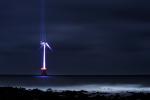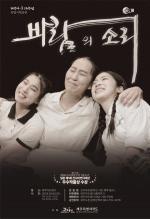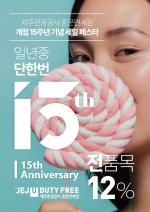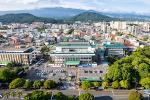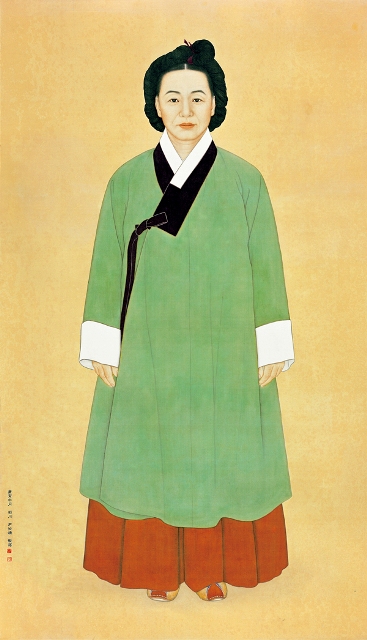 |
||
| Feminist icon and Jeju woman, Kim Man Deok. Photo from the leaflet of Mandeokgwan. Photo courtesy Mandeokgwan | ||
“Better to be born a cow than a woman.”
In this historic and well-known Jeju phrase, the valuing of males over females – even in this traditionally egalitarian, matrifocal island society with its “Asian Amazons” – is clearly established.
The subject of Jeju women and gender equality is timely: the 57th Commission on the Status of Women [CSW57] takes place in the United Nations March 4-15, International Women's Day is observed on March 8, Korea inaugurated its first female president on February 25, and the International Federation of Business and Professional Women will hold its triennial congress on Jeju next year.
Historically, Jeju has been known as an “island of women” as females outnumbered males, worked alongside men in both agrarian and marine labor, and typically had economic control in their families.
Under the rule of the Joseon Dynasty, which exalted Confucianism and firmly elevated men over women, the birth of a daughter was nevertheless a happy occasion in Jeju's coastal villages as she could become a “haenyeo” (diving woman) and thus earn money for her family.
She was not provided with any form of equal status, however, and indeed, for 200 years of that same period, women were forbidden by law to leave this island.
It was during this time that local heroine Kim Mandeok, a trade merchant, became one of Korea's two wealthiest women – and one of Jeju's greatest philanthropists.
Jeju diving women were the driving economic force for several centuries, and as such ruled their homes and communities, though not by holding any actual positions of governance. They also provided political leverage in leading local protests against Japanese rule during the colonial period.
Today, Korea on the whole ranks among the lowest of developed nations in regard to the status of women, particularly in areas of business and politics. As of the latest reports, OECD cited Korea's gender wage gap at more than twice that of the OECD average, with only 8 percent of supervisory roles held by women, fewer than 5 percent female corporate executives, one of the lowest female employment rates of OECD nations – including the lowest ranking for female university graduates hired. Both the Global Gender Gap Report of the World Economic Forum and the Asia Society's report on women's leadership held similar findings.
However, numerous policies and programs have been implemented nationwide to correct this imbalance, including Dynamic Women of Korea, Support of Female Farmers and Fishers Act, Act on Gender Impact Assessment, Gender-sensitive Budgeting, Gender Quality Index, and more.
Beginning in March of 2012, this “island of women” became a participant in the nation's Women-friendly Cities Program, which brings with it a five-year plan for policies and practices that contribute to gender equality. More than 30 cities have been accepted into the program following formal assessment.
Also last year, Governor Woo initiated the Jeju Women's Governance Forum, whereby educational forums are held to contribute to the government's awareness of gender-related concerns.
Jeju has 10 women's organizations in all, with 13,565 members collectively.
In last year's Jeju Forum for Peace and Prosperity, an unprecedented 8 out of 63 sessions had gender-related themes. This year, in light of Korea's new female president and highlighted gender issues, the organizers plan to lead the forum with a special session on this topic.
Statistically, for the first time in centuries, men now slightly outnumber women on Jeju, as reported by the government: 291,500 females represent 49.94 percent of the island's population.
In Jeju provincial government, 29.7 percent of all positions are held by women; in January of last year, the governor publicly stated his desire for 50 percent female representation.
The vast majority of these positions are at a low level. In 5th rank (assistant director) positions or above, 11 percent are held by women; only 2 director generals and 2 division heads are women, plus the director of the government facility for women, Seolmundae Women's Center. Women represent 30 percent of civilian members on government committees, and 24.4 percent of total committee membership.
In Provincial Council, women are appointed by law to five of the 44 positions; only a few women have campaigned for office, and have been unsuccessful to date. Jeju women generally seem reluctant to engage in the political arena.
The numbers are somewhat more positive in the area of economics: 62.4 percent of all women are employed, and women represent 62.7 percent of the total number of employed individuals, for which Jeju ranks highest among Korea's provinces.
Jeju does not generally hold many activities in conjunction with International Women's Day; the only noted event this year was a public forum held at Jeju City Hall Plaza by a local feminist NGO. However, a nationwide “Women's Week” has been held from July 1-7 annually since 1996, during which Jeju government sponsors multiple events.
The status of women, on this “island of women,” is mixed – hopefully, changing for the better.
–
Dr. Hilty is a cultural health psychologist from New York who now makes Jeju Island her home.
Anne Hilty eastwest.psyche@gmail.com
<저작권자 © 제주위클리 무단전재 및 재배포금지>

